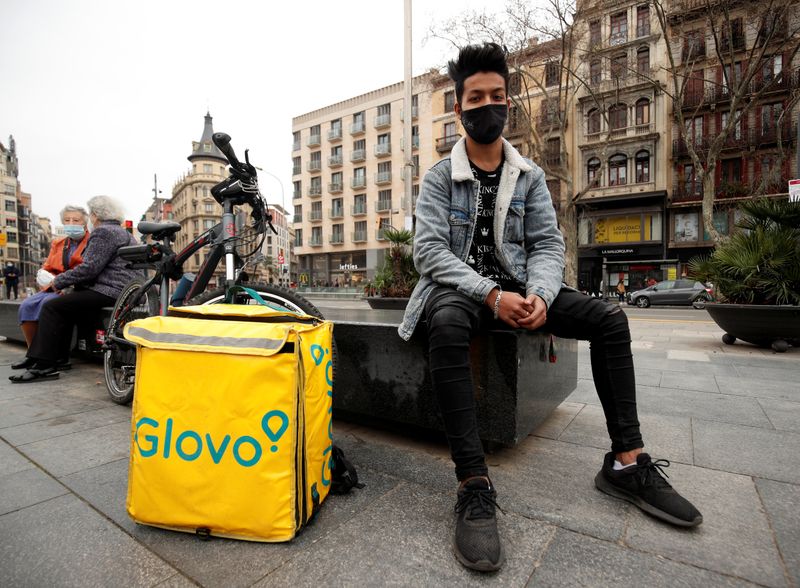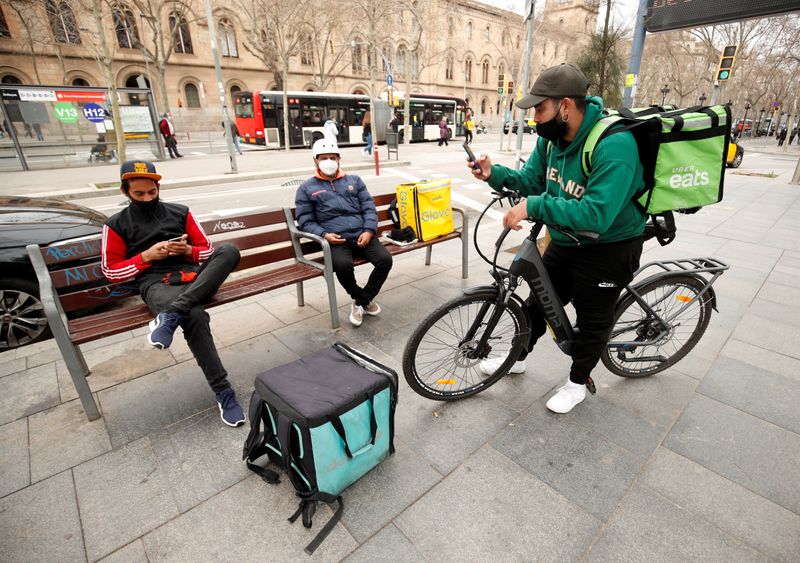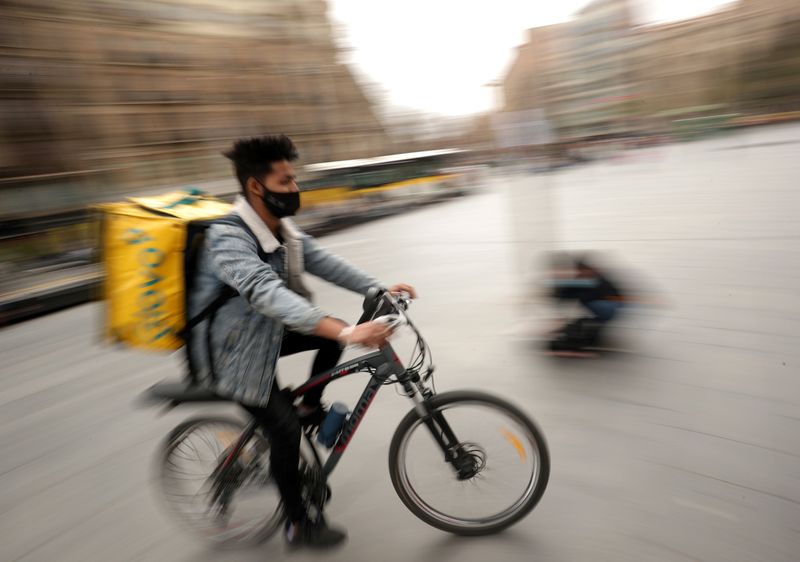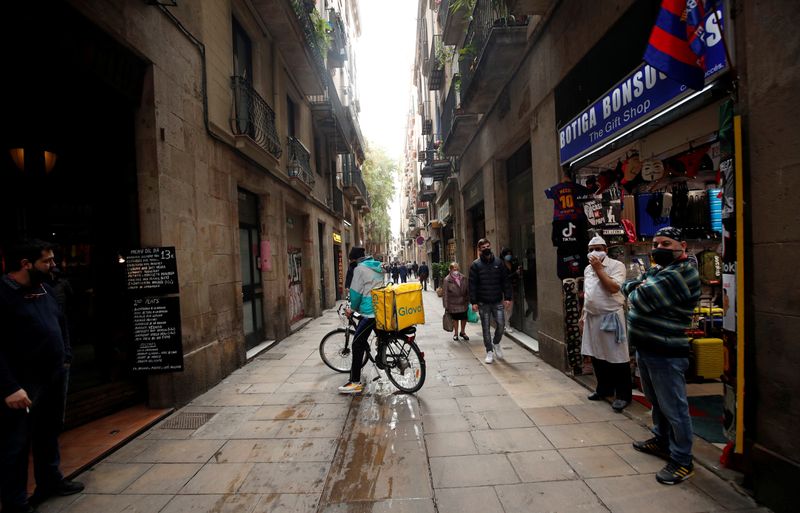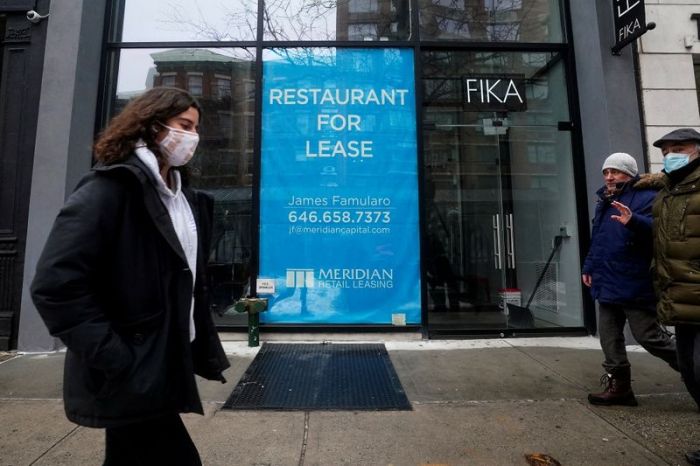MADRID (Reuters) – Thousands of kilometres (miles) away from his native Venezuela, 48-year-old Nestor Perez died last month on the streets of Madrid when he was hit by a garbage truck while delivering a food order for Deliveroo.
Such tragedies have cast a spotlight on the precarious conditions of often immigrant workers in Spain’s gig economy at a time when the government, ahead of its European peers, is drafting legislation to regulate the sector.
It is the latest challenge to the freewheeling gig economy model in Europe after a landmark UK ruling requiring Uber to pay the minimum wage to its drivers, with the European Union set to propose an EU-wide regulatory framework by year-end.
Spain aims to bolster protections for service sector workers typically hired on freelance basis by requiring employers to put them on staff contracts, government and union sources said.
The move was spurred by a Supreme Court ruling in September that people working for Barcelona-based food delivery app Glovo were employees, not freelancers, a decision that could enable such workers to demand formal labour contracts and benefits.
Legislative intervention to counter the legal vacuum that makes jobs in the service sector so poorly paid and insecure is welcome news for gig workers, at first glance.
“It would be nice for me to have a contract and a fixed salary,” said Rana Azad, 28, a Barcelona delivery rider. He said he has been on duty for up to 10 hours a day recently but earning only 10-15 euros per shift. “This doesn’t help me to live, to eat, to support my family,” he told Reuters.
Details of a regulatory regime for gig employment are being discussed with Spanish unions and business associations and could be unveiled as early as this week, government and union sources said.
“Brussels sees our proposal as going in the right direction,” a government source, referring to the EU executive.
But labour and legal experts fear that the main consequence of the legislation, rather than full staff contracts with gig companies, could be an ever greater reliance of the service sector on subcontractors and temporary work agencies.
The new law will not spare riders from the costly, possibly unaffordable, necessity of going to court if delivery app companies do not hire their staff directly, said labour rights lawyer Adrian Todoli.
“These new models of subcontracting they are creating, and which might be fraudulent, will have to go through the judicial process again until they are declared illegal by the courts.”
WORKAROUND TACTICS?
A source in the delivery sector said that if companies were obliged by law to put riders on staff, they would likely work around this by recruiting them via temporary job agencies.
Branches of large multinationals in the gig sector, such as Deliveroo and Uber, have criticised the legislative initiative, saying it would strip riders of their independence in choosing when and where to work.
Some riders were also doubtful about the legislation’s impact.
“Okay, it’s fine to have insurance and a fixed salary, but what if we need more money? We can’t tell the boss of Uber or Glovo to raise our salary or give us more overtime. No, we can’t say that, there is no way to do it,” said Manzurul Hoque, 19, a Bangladeshi rider in Barcelona.
When he died, Nestor Perez was working for an intermediary firm without having a personal Deliveroo account – one of many examples of how gig companies try to avoid having riders on their, and the responsibility for their working conditions.
Such outsourcing of labour could be illegal in Spain if a firm outsources its workers exclusively to a third party, unless it is a recognised temporary placement agency, said Ana Ercoreca, president of the labour inspectors union.
Government sources and major unions said their preferred approach was the one being implemented by Just Eat’s Spanish branch, whose parent company is Dutch-based Takeaway.
“Our model is that our workers have an employment contract. Either we hire them directly or through logistics companies,” said Patrik Bergareche, Just Eat’s managing director in Spain, referring to messenger and courier services.
Gonzalo Pino of the UGT union that is negotiating gig worker regulation with the government said it backed Just Eat’s hybrid model as long as it entailed collective bargain agreements.
But some riders’ groups prefer all workers to be hired directly by online delivery companies. That would mean social security costs amounting to about a third of payroll, paying at least the minimum wage and providing the means to do the job – for instance a motorbike to deliver food.
In Nestor Perez’s case, two sources familiar with the investigation into his death said the outsourcing of his work via a Deliveroo account owned by someone else was legally vague.
His brother Ronald told Reuters from Caracas that Deliveroo had helped pay the funeral expenses but the family had struggled to contact the online account holder for whom Nestor worked.
Ronald Perez said the family was considering court action. “Even if we sue, we are not going to get a life back. But we want to set a precedent,” he said, without specifying what the objective of a lawsuit would be.
Deliveroo said it would “support” Perez’s family, but declined to elaborate.
(Reporting by Belén Carreño, Joan Faus, Luis Felipe Castilleja, Elena Rodríguez and Silvio Castellanos; Writing by Belen Carreno; Editing by Ingrid Melander and Mark Heinrich)


